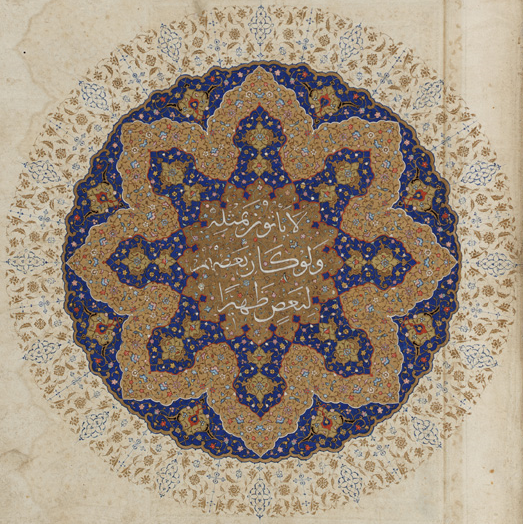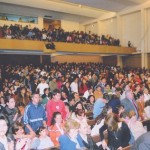The following is an installment of the Religious Fundamentalism and Sexuality Project. Read the previous installment here. You are also invited to join the project.

Sex Education and the Body
Q. 2: How did your parents and/or church respond to your questions (if any)? How did they (and you) understand and react to puberty?
Calulu
My parents could not be approached for any questions involving sex I learned around the time I turned eight. One day I innocently asked what a certain ‘dirty’ word meant only to be told by my mother to ask my father. Once my father came home I asked him and was told that a) he didn’t know and b) if I EVER said that word I would not be able to sit for a week he’d paddle me so hard.
The nuns at school merely said that good girls don’t fool with boys. That was the limits of my parents and church sex ed.
When I had my first menstrual cycle at 11 years old I remember running out of the bathroom screaming that I was dying. My mother came to see why I was carrying on and ended up handing me a thin blue pamphlet with flowers on the cover, telling me mysteriously to ‘read this’ as she handed me a box of sanitary napkins, leaving me to work out alone what was happening to my body. She behaved as if anything to do with bodily functions was gross, secret and never spoken about again. I remember being so shocked that I was going to have to go through my period every single month!
Jenn
I didn’t ask questions about sex or puberty. I hid the fact that I was menstruating from my mom for a year because I was too embarrassed to talk about it. I do remember some of the girls in my neighborhood who went to public school talking about Are you there God? It’s me, Margaret by Judy Blume, but I never read it. While many girls were hoping for their period, I was dreading it. I didn’t want to be a woman. I didn’t want to lose my independence, which is how I viewed transitioning from childhood to adulthood.
Later, after I was married my dad showed me the movie Pamela’s Prayer and told me it was what he always wanted for me. It’s very much a purity/courtship movie. Pamela’s best friend has sex before marriage at one point in it and they view it as death. It’s shocking how minimized the character of the women are. I wrote a post about it on my old blog: This Movie is Rated G for Nauseating.
Libby Exline
I only remember asking questions twice. Once I asked my mother how babies were born. She gave an age-appropriate answer about pensises and vaginas, and the matter was dropped. Years later, while I was going to the church school, I asked during a chapel meeting if there were sexes in heaven. The teacher gasped in shame, and I was asked to keep questions like that to myself. I felt a lot of shame for days after.
Meggie
My parents are quite shy and found it difficult to answer my questions. They left it to school, which fortunately had an excellent PD program, and friends parents and aunties, who were very open. I learnt everything I needed to know and more. At the time I wondered a bit about why I was talking to and learning things from my friend’s mum rather than my own, but now I think this was a really good thing. Mum found it hard so she passed the job on to someone who was more capable.
My daughter and I talk a lot. I think I am doing an ok job. She says I am. My sister-in-law can barely say the word puberty. As far as I can work out, the eldest read a lot of books to figure stuff out. The second talk to me. (We are very close despite everything her father does to try to keep us apart.) These two have educated the younger girls. Not ideal.
Parker
My mother taught me the basics of how sex worked. She did not provide any emotional counterpart, just the mechanics. However, there are so many negative inferences in the William Branham “Message of the Hour” (WMB) teachings it was understood we should not discuss the subject. I was prepared for puberty, because I had an older sister. However, puberty, in my mind, is different from sex. When I reached puberty, it was a biological event. When I had sex (many years later), it was fundamentally different. When I finally had an orgasm in conjunction with sex (long afterward), it was different yet. When I had an orgasm “given” to me during sex (years and years and years afterward), and not something I had to “fight” for, it was amazing how it changed the way I view my body.
Vyckie
I am going to respond to this from a QF parent’s perspective – so the question would read: How did you and your church respond to your children’s questions (if any)? How did you (and they) understand and react to puberty?
I was heavily involved in the pro-life movement, and had gone so far as to associate and identify with the more extreme leaders of the movement such as Randall Terry (Operation Rescue), Flip Benham (Operation Save America), and Paul deParrie (Life Advocate magazine: “Reversing the Curse“) – all of whom rejected all forms of birth control, including Natural Family Planning – even in the cases of endangerment to the life and health of the mother.
It was through these resources, as well as under the influence of Mary Pride and Nancy Campbell, that I came to believe that American culture takes a seriously messed up approach to adolescents and puberty. I believed that biblical culture, in which developing girls were not encouraged to indulgently fritter away their fertile years, but rather, young women were full participants in the adult world – either in service to their fathers, or else via marriage and motherhood. Why give girls Cabbage Patch Dolls and Easy Bake Ovens when they could be focusing their nurturing instincts tending to real babies (either younger siblings, or children of their own), in real kitchens, preparing real meals?
This way of thinking greatly influenced my ideas about puberty. I believed that sexual development was the inevitable progression toward a girl’s fulfillment of her God-given purpose: to bear children and raise them up to love Jesus and glorify Him with their lives. I taught my daughters that their bodies were perfectly designed by God, and when their feminine bodies began doing female things, such as developing breasts and menstruating – they should be grateful for the privilege of possessing bodies capable of giving life and nourishing children. My older daughters tell me that they do not remember me ever teaching them about sexual development – though it seemed to me like I did an awful lot of talking on that subject. I think the discrepancy in memories can be partially explained by the fact that I was so wrapped up in the ideological, theoretical considerations of womanhood that I didn’t directly respond to their questions about the actual physical processes.
I did listen to them enough to pick up on the fact that they hated their female bodies and thought the boys were so much luckier. I could not understand why they would feel that way when I was doing my utmost best to explain to them and model for them a worldview in which womanhood is highly valued, cherished, and protected. Amazingly, it never occurred to me that watching their mother perpetually suffer through pregnancy after life-threatening pregnancy was repulsive and frightening to them – I was so sure they would be inspired by my dedication. My daughters all absolutely loved their baby brothers and sisters – it seemed to me that they would naturally and logically conclude that the “blessings” were worth all the trouble I went to in order to bring them into this world.












